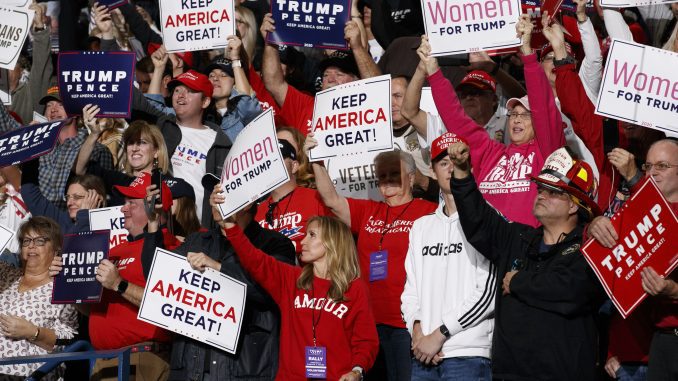
RALEIGH — In 2016, then-candidate Donald Trump won the presidential election with large rallies, social media and free television time gained by staying in the headlines. While some of this can be replicated in the 2020 race, COVID-19 has caused major disruptions to social dynamics, including how campaigns can be run. In response, the president’s re-election campaign is focusing on ways to maintain contact with voters even when physical proximity is not an option.
Daily coronavirus briefings, flanked by cabinet officials and medical advisers, have filled any visibility gap created by no longer being able to hold large rallies across the country. The briefings may have even increased Trump’s visibility, with high viewership and rising poll numbers. Some media members, suspicious this advantage is by design, have suggested outlets no longer run these briefings, saying they cannot fact-check them in real-time and that Trump is using the opportunity to praise his record as much as giving needed information.
Likely Democratic nominee Joe Biden has struggled to gain the same level of airtime, but after building a makeshift studio at his home in his Wilmington, Delaware, the former vice president has started holding virtual briefings and media interviews of his own. However, gaffes and technological glitches marred the initial rollout. On March 30, Biden’s campaign also unveiled a new podcast, called “Here’s the Deal,” that would offer another way for the candidate to connect with voters despite the required “social distance.”
Any amount of media presence, however, cannot fully replace the campaign trail. Aides tout Biden’s affinity for retail politics and his personal connections in one-on-ones, and they say they’re trying to find ways to bring that out. But they also agree that a call-in session is not the same as asking a would-be president a question in person or standing on the rope line and sharing a personal moment after an event.
Beyond the optics of rallies, television and town halls for the candidates, there are many thousands of campaign staff and volunteers across the country whose roles also have changed dramatically overnight.
On March 21, the Trump campaign held a “National Day of Action” across the country. Unlike past days of action, this one was done entirely remotely. All volunteers worked from their homes using an app called Trump Talk to know which numbers to dial, what to say and how to record data from the call. If no one answered, a message from Lara Trump, the president’s daughter-in-law, was left automatically on their voicemail.
Samantha Cotten, communications director for Trump 2020 in North Carolina and surrounding states, told NSJ the NDOA blew away previous events. With around 1.5 million voter contacts, the event, she said, surpassed any comparable days, or even weeks, from the 2016 and 2018 cycles.
In addition to voter contact, the campaign is also performing its trainings now at a distance. The Trump Victory Leadership Initiative trainings, which are the Republican National Committee’s “signature training program,” have gone digital, with hundreds of virtual meetings being held with volunteers and staffers across the country. According to the RNC, it now has 550,000 “trained and activated” volunteers ready for 2020.
When asked if the 2020 Republican National Convention in Charlotte will proceed as planned despite the global pandemic, a Republican National Convention spokeswoman told NSJ they “remain committed to planning a safe and successful” event in late August.
“As we have done throughout our planning, we will ensure the convention prioritizes the health and safety of delegates, media, guests and community members,” she said. “In light of the spread of COVID-19, we will take additional steps to ensure the safety and health of all attendees, and we will continue to communicate with federal, state and local health experts in our planning.”
A convention official also told NSJ that new processes and protective measures in response to COVID-19 will be necessary, and the RNC is engaged with the relevant groups who will be helping to develop those guidelines. The official said because of their fantastic partners in Charlotte, they believe it will be a “five-star event” and a needed economic boost to the area.
The Democratic National Committee is also not canceling their mid-July convention in Milwaukee, according to a March 23 statement from DNC communications director Xochitl Hinojosa to Politico. “There are no plans to cancel the convention and we are not considering a rules change at this time. Contingency planning is a routine part of preparations for any convention.”




